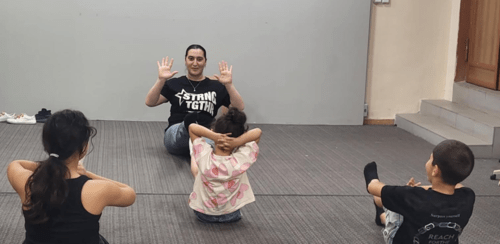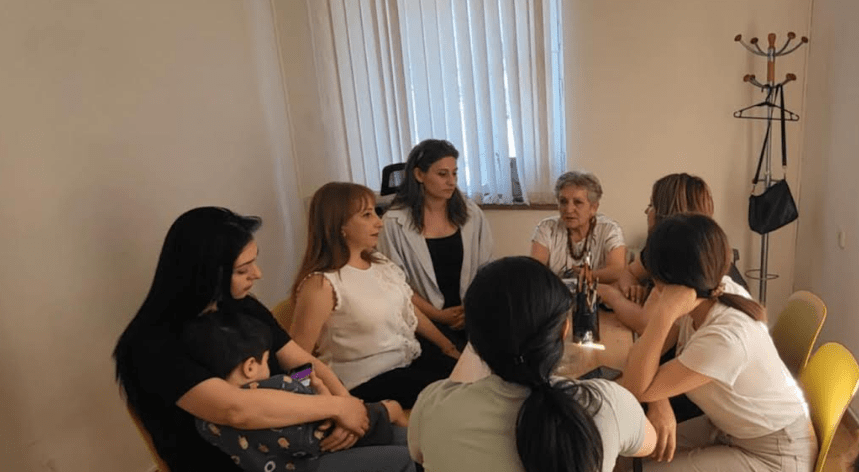Psychologists call support for Karabakh refugees necessary
Refugees from Nagorno-Karabakh, including children, are having a hard time being forced to move to Armenia; the situation is aggravated by financial problems. The psychological support that 250 families have received helps them overcome the adaptation difficulties, experts from the New Perspective Project believe.
The Project began operating in Nagorno-Karabakh after the 2020 war and continued during the blockade until the forced displacement of the indigenous population to Armenia. In Armenia, the mission resumed its activities in Yerevan and opened branches in dwelling settlements in Armenia where refugees from Nagorno-Karabakh were settled. The initiative operates free of charge and involves 14 specialists, 12 of whom are refugees from Nagorno-Karabakh. They are psychologists, social workers, teachers of dance, drawing and applied arts, the "Caucasian Knot" correspondent reports.
"The project mission is to promote the preservation of the community and identity of Artsakh (Karabakh) compatriots, as well as their integration into the new society through various rehabilitation methods," the project coordinators told the "Caucasian Knot" correspondent.
"The New Perspective Project was launched as the work of a group of proactive people who wanted to help their society. This group was assembled also by the Indie Peace organization with the support of the European Union (EU), which continues participating in the life and development of the team, finding opportunities for the team members to develop in a variety of ways. In particular, since January 2025, with the support of the Lithuanian Fund for Development Cooperation and Humanitarian Aid, the team has attended a course of five workshops on the development of civil society – how to build and develop our own NGO, and on conflictology," said Katerina Kaloeva, a coordinator of the New Perspective Project.
According to her story, "initially, during the blockade of Nagorno-Karabakh, the team consisted of psychologists and active citizens of Nagorno-Karabakh and was supported remotely; then, other people who live in Armenia and who became close to the project values and ideas joined the group."
During its work, the project provided support to more than 250 families, Katerina has noted, clarifying that "the project specificity is that from its very start, it responded to the needs of a wide variety of people, children and adults, children with disabilities," and that "the age bracket of the project beneficiaries is from 2.5 to 69 years."
"Our psychologists work with groups of toddlers, primary school children, teenagers and young people; there are also groups for parents of different ages. Often, assistance was provided to several children from one family, as well as to parents, work was conducted with parent-child pairs, which contributed to the improvement and stabilization of the situation in the family. New participants are regularly joining the project; as a rule, these are people who were recommended to the project by those who had already received support from our experts. The project also has a page in the Facebook* social network, where we post invitations to join the process. The New Perspective is a network organization represented in Yerevan and in the cities of Armenia – Stepanavan, Martuni, Abovyan, and recently also in Razdan. The opening of the group in Razdan nicely characterizes the project, since our coordinator and expert, Irina Grigoryan, during a visit to this city, learned about the existing need for regular work with a psychologist among female refugees from Nagorno-Karabakh; and the project found and implemented such an opportunity," Ms Kaloeva has explained.
Speaking about work with teenagers, she noted that "this is a regular area of the project, which began during the blockade of Nagorno-Karabakh."
"The New Perspective responds sensitively to requests in groups; work programmes are drawn up taking the needs into account. Earlier, all difficulties were associated with the war consequences and forced resettlement, and the need to adapt to new conditions. The topics that are addressed in teenager groups are as follows: bullying and how to deal with it, friendship, communication skills, formation of positive thinking, development of self-confidence and skills for overcoming life's difficulties, career guidance and skills for coping with stress during exams," Katerina Kaloeva has added.
She mentioned among the pressing problems that "often this is a socio-economic problem, when refugees’ parents, trying to get back on their feet, have no chances to support, please their children with new clothes and new gadgets, and it is at this age that this is acutely felt."
"The guys also don't feel completely ‘at home’ in Armenia, but they can't return to Nagorno-Karabakh. There is a feeling of being ‘deprived’ of their history, territory, and future. Although they speak the literary Armenian language, they differ in mentality, habits and speech, and this causes misunderstanding. Some face prejudice, especially in schools and courtyards; they suffer from the loss of old friends, neighbours and school group; they suffer from difficulties in establishing new stable connections. Families often live in dormitories, temporary houses or rented apartments with poor living conditions, where they lack of personal space and have family conflicts. There are cases when teenagers feel like a burden or often start working part-time early, or take on the care of their family members," the coordinator has reported.
Children, getting into such traumatic situations, begin living the adult life; they are forced to grow up quickly.
"All the people, regardless of age, who have gone through wars, blockades, loss of homes and homeland, familiar way of life, the need to adapt and build life anew, have similar problems. Besides, children, when getting into such traumatic situations, start living the adult life, are forced to grow up quickly. And for a long time we worked in adult and children's groups on how to survive what happened, how to deal with all the feelings that froze in people’s souls; we psychologically accompanied our participants during integration, adaptation and understanding of the life experience that they had received. But an important stage was that, for example, in the parent group, female members discover in themselves the strength and desire to help others, newcomers to the group or relatives and neighbours. We strive, as our psychologist said, so that ‘children can live without missing their childhood, while before they lived only with adult problems," Katerina Kaloeva, the project coordinator, has noted.
Anush Tsatryan, a choreographer from Stepanakert, has been working in the New Perspective Project for several months. She conducts dances with elements of movement therapy with different age groups.
 "The blockade, war, forced displacement and loss of relatives inflict terrible traumas for children whose psyche is still developing. Recovery from such experiences requires a delicate and always individual approach. I offer dances with movement elements that allow them to feel their bodies, release the accumulated tension, anxiety and frozen pain. At the beginning of classes, the emphasis is on creating a stable rhythm and a supporting structure – this helps to regain the feeling of predictability and support, which is so important after one’s traumatic experience. Gradually, freer improvisations are introduced, allowing children to express their suppressed emotions. Special attention is also paid to restoring contact with other group members, which teaches them to trust each other and to be together. The goal is not to dance ‘correctly’, and even improvisation is practiced. Such work requires care and time, but it gives amazing results. This is noted both by experts and parents," the choreographer has remarked.
"The blockade, war, forced displacement and loss of relatives inflict terrible traumas for children whose psyche is still developing. Recovery from such experiences requires a delicate and always individual approach. I offer dances with movement elements that allow them to feel their bodies, release the accumulated tension, anxiety and frozen pain. At the beginning of classes, the emphasis is on creating a stable rhythm and a supporting structure – this helps to regain the feeling of predictability and support, which is so important after one’s traumatic experience. Gradually, freer improvisations are introduced, allowing children to express their suppressed emotions. Special attention is also paid to restoring contact with other group members, which teaches them to trust each other and to be together. The goal is not to dance ‘correctly’, and even improvisation is practiced. Such work requires care and time, but it gives amazing results. This is noted both by experts and parents," the choreographer has remarked.
Anush Tsatryan also works in one of the comprehensive schools in Armenia. She notes that the adaptation and integration of refugee children into life is slow.
"Our children somehow immediately became adults. The war, blockade and exile made their worldview adult and creates difficulties for their integration into society. I still see that Karabakh children, if you do not work with them, don’t want to open up; they have difficulty accepting the joy that is inherent in their peers. Our children see social and psychological problems in their families and yearn for the pre-war life. Therefore, psychotherapy is a must for all children. And the fact that our project also works with parents gives good results," Anush Tsatryan has summed up.
Anait Tevosyan, a psychologist from Stepanakert, joined New Perspective as a specialist when the mission began its activities in Nagorno-Karabakh. Now, her two children receive psychological support within the project framework.
"After the 2020 war, and especially during the blockade, our mission faced most difficult tasks. Children endured not only physical fatigue, but also colossal emotional pain – someone lost a loved one, someone's home was destroyed as a result of the bombing, everyone developed anxiety and detachment. During the blockade, malnutrition was added. We drew, played, just talked, and had small gatherings with meagre treats. Then, apart from all these severe psychological traumas, they also lost their homes, friends, and got into a new environment. It is impossible to work with such children ‘by the textbook.’ Special delicacy is needed. Although slowly, children are returning to life. Some begin drawing again; some hug or laugh for the first time. I saw this in my children," the psychologist has noted, adding that "every refugee needs psychological support – this is a common trauma that families have lived through as a whole."
"If we want children to truly recover, then we need to have adults around them who are also beginning to heal from traumas. Psychological assistance should be part of the basic support along with food, shelter and education. But, unfortunately, socio-economic problems do not allow everyone who wants to attend our sessions. For example, there are a lot of people who want to, children and adults, who live in the outskirts of Yerevan. But getting to city centre is problematic for them due to financial problems. Refugee families have understanding and motivation, but no opportunities. We often hear wishes from people that New Perspective programmes operate in places far from central Yerevan," the psychologist believes.
Narine Ambartsumyan from Nagorno-Karabakh receives psychological support together with her child within the framework of New Perspective Project.
She says, "I’ve never regretted that we are in the New Perspective programme. My child, along with adults, has gone through hard trials. I doubted whether it was worth spending time and effort on a psychologist. But then I saw that we survived, but we were not living. And now we are starting to return to life. A psychologist will not give us our home back. But she helps us build a new one – inside ourselves. And this is priceless," the young woman said.
This was originally published on the Russian page of 24/7 Internet agency ‘Caucasian Knot’ on June 16, 2025 at 01:36 pm MSK. To access the full text of the article, click here.
Source: CK correspondent

